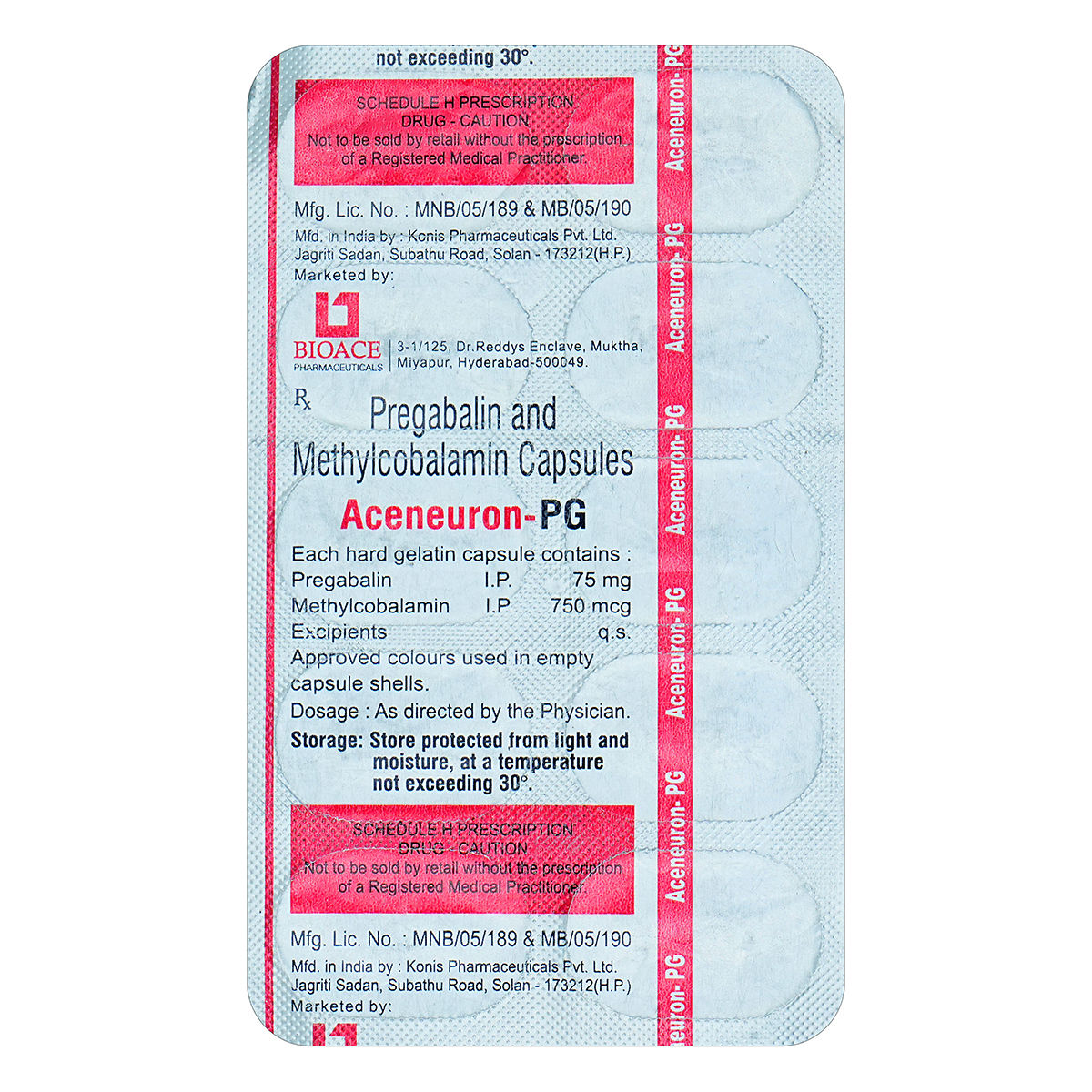Pregabalin+methylcobalamin
About Pregabalin+methylcobalamin
Pregabalin+methylcobalamin belongs to the class of medications ‘anticonvulsants’ used in the treatment of neuropathic pain. Neuropathic pain is a chronic (long-term) progressive nerve disease that causes nerve pain due to nerve damage or the nervous system's malfunctioning. It is mostly seen in patients who had suffered a trauma or nerve injury, diabetes, vitamin deficiencies, cancer, multiple sclerosis (disease of the brain and spinal cord), shingles (a viral infection), and HIV.
Pregabalin+methylcobalamin is a combination of two medicines: Pregabalin and Methylcobalamin. Pregabalin acts by decreasing the pain signals sent by a damaged nerve in the body. On the other hand, Methylcobalamin helps rejuvenate and protect damaged nerve cells by producing a substance called myelin (outer protective layer of nerve cell - neuron).
You should take this medicine as prescribed by your doctor. The common side-effects of Pregabalin+methylcobalamin are dizziness, drowsiness, headache, anorexia (loss of appetite), nausea or vomiting, diarrhea, headache, hot sensation (burning pain), vision problems, and diaphoresis (sweating). Inform your doctor if any of these side effects persist.
Do not take Pregabalin+methylcobalamin if you are allergic to ‘Pregabalin’ and ‘Methylcobalamin’ or any contents before taking Pregabalin+methylcobalamin if you have a history of heart diseases, liver or kidney disease, alcoholism, or drug abuse. It should not be used in children and adolescents below 18 years. Inform your doctor if you are pregnant and breastfeeding. Do not drive or operate heavy machinery as Pregabalin+methylcobalamin may cause dizziness or drowsiness. Pregabalin+methylcobalamin contains lactose, so inform your doctor if you have any intolerance to sugars. Do not discontinue treatment without telling your doctor.
Uses of Pregabalin+methylcobalamin
Medicinal Benefits
Pregabalin+methylcobalamin is a combination of two drugs: Pregabalin and Methylcobalamin. Pregabalin is an anticonvulsant that affects the brain's chemicals that send pain signals across the nervous system. It works by binding to the specific site on voltage-gated calcium channels (responsible for excitatory response), thereby decreasing brain activity. This effect helps in relieving nerve pain and lowers the risk of seizures. On the other hand, Methylcobalamin is a form of vitamin B12 that helps rejuvenate and protect damaged nerve cells by producing a substance called myelin (outer protective layer of nerve cells). Together, Pregabalin+methylcobalamin helps in providing relief from neuropathic pain and improved nerve signal conduction.
Directions for Use
Storage
Side Effects of Pregabalin+methylcobalamin
- Dizziness
- Drowsiness
- Headache
- Anorexia (loss of appetite)
- Nausea or vomiting
- Diarrhea
- Headache
- Sore throat
- Vision problems
- Hot sensation (burning pain)
- Diaphoresis (sweating)
- Weight gain
Patients Concern
Disease/Condition Glossary
Neuropathic pain: Neuropathic pain is caused due to damage to sensory nerves. It is caused by chronic progressive nerve disease, infection, or injury. The pain could be intermittent or continuous, which is felt as a prickling, stabbing, tingling, or burning sensation. A feeling of numbness and loss of sense is also a common symptom of neuropathic pain. Usually, the body sends the pain signals when there is an injury, but with neuropathic pain, the pain is not triggered by an injury, the body unpromptedly sends the pain signals. Symptoms include spontaneous, untriggered pain, unpleasant feeling, shooting, burning or stabbing pain, difficulty resting or sleeping, and evoked pain (pain caused by events usually not painful).
FAQs
Pregabalin+methylcobalamin is a combination of two medicines: Pregabalin and Methylcobalamin. Pregabalin+methylcobalamin block the brain's pain signals and protect nerve cells from further damage, thereby improving nerve signal conduction to the whole body parts. These effects help to reduce pain in patients with neuropathic pain.
Pregabalin+methylcobalamin should not be given to children and adolescents under the age of 18 years as it may increase suicidal thoughts.
Pregabalin+methylcobalamin should not be stopped abruptly as it may cause withdrawal reactions such as trouble sleeping, headache, nausea, feeling anxious, diarrhea, flu-like symptoms, convulsions, nervousness, depression, pain, sweating, and dizziness. Pregabalin+methylcobalamin should be stopped gradually over a minimum of 1 week.
Pregabalin+methylcobalamin can be used in patients with diabetes if they have neuropathic pain. However, inform your doctor if you notice any weight gain while using Pregabalin+methylcobalamin. Your doctor may change your diabetic medicines to stop weight gain. Also, take some measures to control weight such as eating a balanced diet and exercising regularly.
Pregabalin+methylcobalamin may cause drowsiness. So, it is advised to refrain from activities such as driving or operating heavy machinery if you feel sleepy after taking Pregabalin+methylcobalamin.
You may notice pain improvement within 2-3 days after taking Pregabalin+methylcobalamin. However, it may take 2-3 months for your symptoms to improve depending on your health condition.







